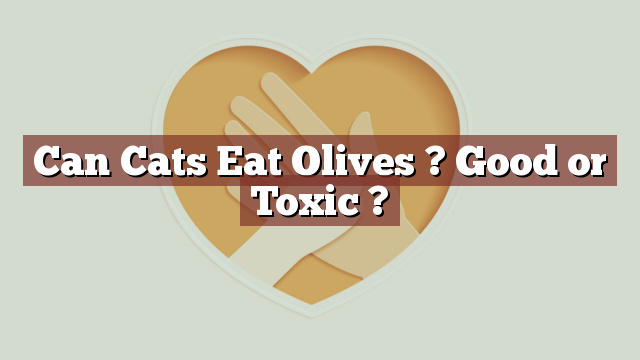Can Cats Eat Olives? Are They Safe or Toxic?
When it comes to our furry friends, it is important to know what foods are safe for them to consume. Cats have unique dietary needs, and their digestive systems may not be equipped to handle certain human foods. One such food that often raises questions is olives. Can cats eat olives? Are they safe or toxic for our feline companions? Let’s delve into the topic and find out.
Nutritional Value of Olives: What Do They Contain?
Olives are a popular Mediterranean fruit that is often used in various culinary dishes. These small fruits are rich in healthy fats, antioxidants, and vitamins. They provide a good source of vitamin E, iron, and copper. Olives are also known for their high monounsaturated fatty acid content, which is beneficial for heart health.
Can Cats Eat Olives? Are They Safe or Toxic?
No, cats should not eat olives. While olives themselves are not considered toxic to cats, they are not recommended as a part of their regular diet. Cats are obligate carnivores, meaning that their bodies are designed to primarily digest and metabolize animal protein. They do not require plant-based foods like olives for their nutritional needs.
Olives can be difficult for cats to digest due to their high oil content and the presence of pits. Ingesting olive pits can pose a choking hazard or even cause intestinal blockage in cats. Additionally, the strong flavor of olives may not appeal to most cats, and they may not find them palatable.
Potential Risks and Benefits of Cats Eating Olives
While there are no significant health benefits for cats consuming olives, there are potential risks involved. As mentioned earlier, the pits can be a choking hazard or cause digestive issues. The high oil content in olives can also lead to gastrointestinal upset, such as diarrhea or vomiting, in cats. It is best to avoid offering olives to your feline friend to prevent any potential health problems.
What to Do If Your Cat Eats Olives: Steps to Take
If your cat accidentally consumes olives, it is important to monitor their behavior and overall health. Keep an eye out for any signs of discomfort, such as vomiting, diarrhea, or abdominal pain. If your cat exhibits any unusual symptoms or seems unwell, it is advisable to consult a veterinarian for guidance.
Conclusion: Should Cats Eat Olives? Considerations
In conclusion, cats should not eat olives as they offer no substantial nutritional benefits and may pose potential health risks. Cats have specific dietary requirements that should be met with a balanced and appropriate diet specifically formulated for their needs. It is always recommended to consult with a veterinarian regarding any uncertainties about the safety of certain foods for your feline companion. Ensuring a proper diet is crucial to keeping our beloved cats healthy and happy.
Thank you for investing your time in exploring [page_title] on Can-Eat.org. Our goal is to provide readers like you with thorough and reliable information about various dietary topics. Each article, including [page_title], stems from diligent research and a passion for understanding the nuances of our food choices. We believe that knowledge is a vital step towards making informed and healthy decisions. However, while "[page_title]" sheds light on its specific topic, it's crucial to remember that everyone's body reacts differently to foods and dietary changes. What might be beneficial for one person could have different effects on another. Before you consider integrating suggestions or insights from "[page_title]" into your diet, it's always wise to consult with a nutritionist or healthcare professional. Their specialized knowledge ensures that you're making choices best suited to your individual health needs. As you navigate [page_title], be mindful of potential allergies, intolerances, or unique dietary requirements you may have. No singular article can capture the vast diversity of human health, and individualized guidance is invaluable. The content provided in [page_title] serves as a general guide. It is not, by any means, a substitute for personalized medical or nutritional advice. Your health should always be the top priority, and professional guidance is the best path forward. In your journey towards a balanced and nutritious lifestyle, we hope that [page_title] serves as a helpful stepping stone. Remember, informed decisions lead to healthier outcomes. Thank you for trusting Can-Eat.org. Continue exploring, learning, and prioritizing your health. Cheers to a well-informed and healthier future!

